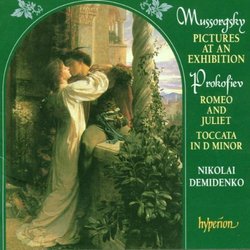| All Artists: Modest Mussorgsky, Sergey Prokofiev, Nikolai Demidenko Title: Mussorgsky: Pictures at an Exhibition/Prokofiev: Romeo and Juliet Suite Members Wishing: 1 Total Copies: 0 Label: Hyperion UK Release Date: 3/10/1998 Album Type: Import Genre: Classical Styles: Chamber Music, Forms & Genres, Suites, Historical Periods, Classical (c.1770-1830) Number of Discs: 1 SwapaCD Credits: 1 UPC: 034571170183 |
Search - Modest Mussorgsky, Sergey Prokofiev, Nikolai Demidenko :: Mussorgsky: Pictures at an Exhibition/Prokofiev: Romeo and Juliet Suite
 | Modest Mussorgsky, Sergey Prokofiev, Nikolai Demidenko Mussorgsky: Pictures at an Exhibition/Prokofiev: Romeo and Juliet Suite Genre: Classical
|
Larger Image |
CD Details |
CD ReviewsTypical Demidenko Michael Whincop | GRIFFITH UNIVERSITY, QLD AUSTRALIA | 06/10/2000 (4 out of 5 stars) "Demidenko, apparently, is not to everyone's tastes. The learned editors of the Penguin guide are always grumbling about his mannered playing. I can see the criticisms -- Demidenko can be a bit too refined in some music, and this disk presents these risks occasionally. But the pianism here is highly entertaining and original.As ever, we are entertained by some spectacular colourings. There is a passage in the Great Gate just at the beginning of a downwards scale which almost sounds like a carillion! But even Demidenko pales when you play him alongside Richter's Sofia account -- it shows that Demidenko lacks the quintessential barbarism that makes Richter so unforgettable. Hence I dock him a star. The Romeo & Juliet pieces are less occluded by comparison, and you could easily buy the disk for them alone. The pianist's colouristic effects and spacious sonority make for wonderful listening. The Toccata is wonderfully barbarous -- albeit less than wholly spontaneous -- in Demidenko's usual manner." Perfect match between music and pianist Michael Whincop | 10/20/1998 (5 out of 5 stars) "Mussorgsky's Pictures at an Exhibition are more often heard in orchestral transcription but Demidenko shows the work's true pianistic value in the original. This is real virtuoso playing: Demidenko shows superb technique but the musicality is always in the foreground. Similarly for Prokofiev's Romeo & Juliet suite. The piano music was generated out of the ballet music but is quite a separate composition in itself. And as a special lollipop we get a youthful toccata by Prokofiev - a challenge for both pianist and piano... All in all a great performance, by a pianist who plays the music he understands and understands the music he plays." 'Pictures' in Ravel's PIANO Version ... J Scott Morrison | Middlebury VT, USA | 12/26/2003 (4 out of 5 stars) "... Well, not really. What I mean is that this version by Nikolai Demidenko of Musorgksy's piano score of 'Pictures at an Exhibition' is precisely etched and refined like much of Ravel's music. It's as if Demidenko were playing a piano reduction of Ravel's shimmering orchestration rather than the Musorgsky original. At first I was put off by the approach, but it has grown on me over numerous listenings. There is no question but what his playing misses the titanic force of Richter's versions (and particularly that unsurpassable 1958 Sofie recital recording, not to be confused with a 1958 Moscow studio recording). But his fleet fingers do such wonderful things in, say, 'The Ballet of the Chicks in their Shells'(as fleet and light as I've ever heard it), or the final measures of 'Gnomus.' And his colors are extraordinary. 'The Old Castle' is given a dreamlike character, with the tolling mid-range pedal point (so like the tolling bell in Ravel's 'Gibet' from 'Gaspard de la nuit') adding to that quality. 'Tuileries' does not catch the gossipy nature of Richter's account. 'Bydlo' ('The Polish Cart') is not quite as peasantlike as one might like, but it does have weight and inexorability. 'Samuel Goldenberg and Schmuyle' has ample contrast between the two characters; the repeated-note quaking of Schmuyle is startlingly lifelike--one can hear him cringing. 'The Marketplace at Limoges' is delicately drawn, but a tad slow for my taste. 'The Hut on Fowl's Legs' is excitingly macabre; this is probably the most barbaric of Demidenko's tone-pictures; its finale is shimmeringly suspenseful, leading into the explosion of sound at the beginning of 'The Great Gate at Kiev,' except that there is no explosion of sound. I understand that Demidenko is marshalling his forces for the larger climax at the end, but I really think the opening of 'The Great Gate' needs to command more attention. He does manage the ending nicely, however.For me the high point of this disc is the ten-piece suite of piano arrangements (made by the composer himself) of sections from Prokofiev's evening-long ballet 'Romeo and Juliet.' Some of the piano writing is a bit clunky (in anyone's hands), a bit of a surprise coming from such a fine pianist/composer as Prokofiev, but the tunes, my goodness the tunes, the wit, the drama, the romance are quintessential sweet-tart Prokofiev, and I can't make a higher recommendation than that. This is sparkling music and Demidenko seems to be in his element. I find his performance more satisfying--largely because of his wry insouciance and the nuanced shaping of the material--than his major competitor on CD, Frederic Chiu.The disc finishes with Prokofiev's 'Toccata in D minor, Op. 11,' which is given a rumbustious work-out. I may prefer Barbara Nissman's or Martha Argerich's fireworks, but Demidenko more than holds his own; the splashes of minor seconds against thundering left-hand octaves in the middle section gets pretty hair-raising. A heckuva finale to this fine disc.Scott Morrison"
|

 Track Listings (27) - Disc #1
Track Listings (27) - Disc #1